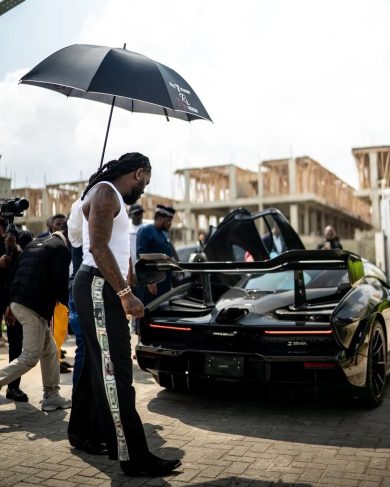Lagos, a city perpetually pulsating with aspirations and undeniable flair, recently bore witness to another grand statement from its sonic ambassador, Burna Boy. The artist, known as much for his unwavering confidence as for his groundbreaking music, took delivery of a new luxury vehicle: a McLaren Senna. This machine instantly ignited conversations across the city and beyond. As videos of the artist navigating Lagos streets in his latest acquisition circulated, the moment became more than just a car delivery; it morphed into a cultural talking point, prompting reflections on wealth, influence, and the ever-present gaze of public scrutiny.
Burna Boy’s relationship with luxury vehicles is well-documented, a visible extension of the “African Giant” persona he meticulously crafts. This isn’t merely about acquiring expensive taste; it’s about a declaration of arrival, a tangible representation of defying odds and reaching stratospheric heights. The McLaren, with its striking design and formidable price tag, naturally commanded attention. It became a symbol, immediate and unmistakable, of the artist’s continued ascent on the global stage.
However, in a landscape as complex and socially aware as Nigeria, such displays of opulence rarely exist in a vacuum. The immediate buzz around the car’s delivery and Burna Boy’s subsequent leisurely drives quickly broadened into a wider agenda. Discussions emerged, sometimes subtly, sometimes overtly, about the optics of such extravagance in a nation grappling with economic realities. The question wasn’t just about the car itself, but what it represented in the collective consciousness.
For some, it was a source of pride, a testament to what is possible for a Nigerian artist on the world stage. It served as inspiration, a vivid illustration of dreams realized through talent and relentless effort. The visual of Burna Boy confidently cruising through the very city that shaped him resonated deeply, affirming a narrative of success that many Nigerians aspire to.
Yet, another layer of discourse quickly formed. In a country where hardship remains a daily reality for many, the visibility of extreme wealth often sparks introspection. Social media became a forum for candid conversations, with voices questioning the societal responsibility of public figures. It wasn’t outright condemnation, but a nuanced engagement with the juxtaposition of immense personal affluence against collective struggles. This agenda, organic and unscripted, highlighted the dynamic tension between individual triumph and shared national experience.
Burna Boy, ever the provocateur, rarely shies away from such conversations. His artistic journey has been built on an unwavering commitment to authenticity, often challenging established norms. This latest vehicular statement, whether intended or not, served as another catalyst for dialogue, underlining his unique position at the intersection of global stardom and local commentary. The McLaren Senna, therefore, is not just a car; it’s a moving piece of performance art, sparking conversation and reflecting the intricate layers of Nigerian society and its relationship with success.


